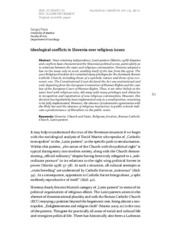Ideological conflicts in Slovenia over religious issues
Апстракт
Since attaining independence, Latin pattern (Martin, 1978) disputes and conflicts have characterized the Slovenian political scene, particularly as to relations between the state and religious communities. Slovenia adopted a law on the issue only in 2006, availing itself of the law from the 1970s. The 2007 Religious Freedom Act contained many privileges for the dominant Roman Catholic Church, including those of a symbolic nature and those of an eco¬nomic one. The Constitutional Court declared the Act unconstitutional and void, departing from the European Convention of Human Rights and the case law of the European Court of Human Rights. Thus, it set other beliefs at the same level with religious ones, did away with many privileges and obstacles in recognition and registration of new religious communities. However, this decision has legislatively been implemented only in a small portion, remaining to be fully implemented. However, the absence of substantive agreements with the Holy See a...nd the absence of religious instruction in public schools indi¬cate a pre do mi nan ce of li be ralism on the pu blic sce ne.
Кључне речи:
Slovenia / church and state / religious freedom / katolicka crkvaИзвор:
Filozofija i društvo / Philosophy and Society, 2014, 81-93Издавач:
- Beograd : Institut za filozofiju i društvenu teoriju
Институција/група
IFDTTY - JOUR AU - Flere, Sergej PY - 2014 UR - http://rifdt.instifdt.bg.ac.rs/123456789/203 AB - Since attaining independence, Latin pattern (Martin, 1978) disputes and conflicts have characterized the Slovenian political scene, particularly as to relations between the state and religious communities. Slovenia adopted a law on the issue only in 2006, availing itself of the law from the 1970s. The 2007 Religious Freedom Act contained many privileges for the dominant Roman Catholic Church, including those of a symbolic nature and those of an eco¬nomic one. The Constitutional Court declared the Act unconstitutional and void, departing from the European Convention of Human Rights and the case law of the European Court of Human Rights. Thus, it set other beliefs at the same level with religious ones, did away with many privileges and obstacles in recognition and registration of new religious communities. However, this decision has legislatively been implemented only in a small portion, remaining to be fully implemented. However, the absence of substantive agreements with the Holy See and the absence of religious instruction in public schools indi¬cate a pre do mi nan ce of li be ralism on the pu blic sce ne. PB - Beograd : Institut za filozofiju i društvenu teoriju T2 - Filozofija i društvo / Philosophy and Society T1 - Ideological conflicts in Slovenia over religious issues SP - 81 EP - 93 DO - 10.2298/FID1402081F ER -
@article{
author = "Flere, Sergej",
year = "2014",
abstract = "Since attaining independence, Latin pattern (Martin, 1978) disputes and conflicts have characterized the Slovenian political scene, particularly as to relations between the state and religious communities. Slovenia adopted a law on the issue only in 2006, availing itself of the law from the 1970s. The 2007 Religious Freedom Act contained many privileges for the dominant Roman Catholic Church, including those of a symbolic nature and those of an eco¬nomic one. The Constitutional Court declared the Act unconstitutional and void, departing from the European Convention of Human Rights and the case law of the European Court of Human Rights. Thus, it set other beliefs at the same level with religious ones, did away with many privileges and obstacles in recognition and registration of new religious communities. However, this decision has legislatively been implemented only in a small portion, remaining to be fully implemented. However, the absence of substantive agreements with the Holy See and the absence of religious instruction in public schools indi¬cate a pre do mi nan ce of li be ralism on the pu blic sce ne.",
publisher = "Beograd : Institut za filozofiju i društvenu teoriju",
journal = "Filozofija i društvo / Philosophy and Society",
title = "Ideological conflicts in Slovenia over religious issues",
pages = "81-93",
doi = "10.2298/FID1402081F"
}
Flere, S.. (2014). Ideological conflicts in Slovenia over religious issues. in Filozofija i društvo / Philosophy and Society Beograd : Institut za filozofiju i društvenu teoriju., 81-93. https://doi.org/10.2298/FID1402081F
Flere S. Ideological conflicts in Slovenia over religious issues. in Filozofija i društvo / Philosophy and Society. 2014;:81-93. doi:10.2298/FID1402081F .
Flere, Sergej, "Ideological conflicts in Slovenia over religious issues" in Filozofija i društvo / Philosophy and Society (2014):81-93, https://doi.org/10.2298/FID1402081F . .


